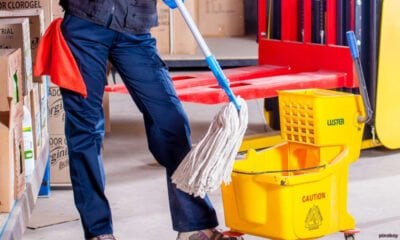Accounting & Finance
Financial Help For UK Businesses Still Struggling Since Lockdown

The pandemic is far from over, and it’s been impossible to ignore the impact the coronavirus (COVID-19) has had on business, the local and global economies and everyday life.
Although many countries claim to be past the ‘peak’, including the UK, where the Government is keen to reduce lockdown measures to help restart the economy, many businesses aren’t out of the woods yet and may struggle in the coming months. Some may find it hard to plug the gap in their cash flow resulting from the downturn in, or lack of trade, without additional funds.
Fortunately, there are options available for businesses, whether they just need some extra finance or more drastic restructuring.
Government Support
While businesses are open, with the new social distancing measures, many won’t be able to operate at full capacity. They may also require extra funds to implement the necessary safety procedures, such as separating screens, extra hand sanitiser, and protective clothing for staff.
Most of the UK Government’s support was introduced at the start of the pandemic when lockdown measures were at their strictest.
Financial support schemes
Three UK Government-funded financial assistance schemes have been lifelines to businesses forced to close or make changes during the lockdown.
The Coronavirus Business Interruption Loan Scheme (CBILS) has supported companies during the lockdown, and the Bounce Back Loan Scheme is helping businesses reopen.
While the Self-Employment Income Support Scheme has aided people who work for themselves.
Where these schemes have been used to tie hibernating businesses over during the pandemic, they can now be used to finance the extra precautions that will allow them to reopen.
Financial Arrangements
While government support is available for businesses struggling to get by, if your business doesn’t meet their lending criteria, there are many third-party finance lenders and brokers too. These companies offer a range of financial solutions which can help companies in different ways depending on what they need.
Through commercial finance, businesses can purchase or borrow new assets or stock—such as safety equipment. They can also re-mortgage and maintain a healthy business cash flow during their arrangements by repaying in monthly instalments. Depending on your business’ circumstances, commercial finance could help it weather the storm in the lockdown’s aftermath.
Third-Party Insolvency Procedures
Unfortunately, the lockdown has proved too much for some businesses. Without being able to open, or being forced to operate on a smaller scale, many limited companies and sole traders are deep in debt.
If a company finds it’s insolvent as a result of COVID-19, there are several insolvency procedures which may help the business recover or close in an orderly fashion if recovery isn’t possible.
These arrangements are tailored to different types of businesses and scenarios. For example, a Company Voluntary Arrangement (CVA) is best suited for companies with viable business plans who wish to repay their debts in affordable monthly instalments.
An administration is for companies with more severe debt issues and involves a third-party taking control of the business.
Liquidation is for the most serious cases; when the debt is of such a magnitude that it’s impossible for trading to continue. These procedures must be carried out by a licensed insolvency practitioner.
Summary
Despite the UK Government’s attempts to ease life back to normal, a lot of businesses are still struggling to make ends meet while they try to reopen safely.
Fortunately, there are solutions available to help companies secure the extra funding needed to trade while adhering to the new safety guidelines. The Government has several loan and support schemes to assist businesses struggling with coronavirus-related debt.
Commercial finance is also an option for businesses needing extra cash to cover new safety-related costs before reopening. If the business’ debts—coronavirus-related or otherwise—have pushed it into insolvency, then a licensed insolvency practitioner can help you find the most suitable solution.




